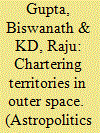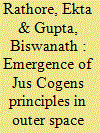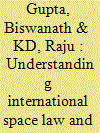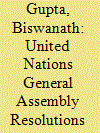|
|
|
Sort Order |
|
|
|
Items / Page
|
|
|
|
|
|
|
| Srl | Item |
| 1 |
ID:
158354


|
|
|
|
|
| Summary/Abstract |
Space research is heralded as the harbinger of the next level of advancement in science and technology. The fact that countries are spending millions of dollars in this regard is testament to its potential. India is making inroads in the field and, in the last 15 years, has established itself as a dominant player. According to Antrix, the commercial wing of the Indian Space Research Organization, India commercially launched 209 foreign satellites of other countries into space. Apart from this, Antrix is applying its success in other commercial activities, like remote sensing, selling of space objects (parts of satellites and launching vehicles), and mission support. In keeping with this development, the Indian legal position and policy framework with respect to commercial space activities are reviewed. The article also surveys India’s commitment to international space law and its reflection in national legislation. Finally, the existing policy related to commercial space in India is examined and measures are suggested to create national legislation for the country to deal with issues of commercial space activities.
|
|
|
|
|
|
|
|
|
|
|
|
|
|
|
|
| 2 |
ID:
171215


|
|
|
|
|
| Summary/Abstract |
International law concerning outer space is developing at a steady pace since humankind’s first step towards space exploration in 1958with the launch of Sputnik 1 and Explorer 1. Since then, space is a growing area of political and economic significance. While significant steps by the international community of states in the form of treaty obligations and principles in international space law are apparent, it is yet to be ascertained whether, and if at all, there are customary international laws or jus cogens principles in place regarding outer space and the issues of governance therein. This paper enumerates and discusses the different principles of outer space law and determines if these principles attain the status of jus cogens.
|
|
|
|
|
|
|
|
|
|
|
|
|
|
|
|
| 3 |
ID:
148497


|
|
|
|
|
| Summary/Abstract |
For the last 50 years, Indian Space Research Organisation (ISRO) has seen a tremendous development in the field of space science and technology. Outer space exploration in social programme (education, telemedicine, communication and information) and economic activities (agricultural forecasting, meteorological data, telecommunication and broadcasting) helped India grow faster. Over the past few years, India is also engaging with other countries, offering them the space science and technology for their overall development.
|
|
|
|
|
|
|
|
|
|
|
|
|
|
|
|
| 4 |
ID:
170637


|
|
|
|
|
| Summary/Abstract |
The status and liability of non-governmental entities for commercial use of outer space activities on behalf of space launching states are not very clear under the existing space law regimes. Non-governmental entities are those who carry private space activities such as commercial launching, supplying different equipment or parts to space agencies and manufacturing spacecraft and satellite. The possible litigation relating to the commercial activities are mainly the financial consequence of damage caused and also the technical complications that private entities face in case of supply of defaulted parts to the space agencies. According to Article VI of the Outer Space Treaty 1967 and Articles II and III of Liability Convention 1972, launching country is liable for any activities in outer space. Even in the case of non-governmental activities, the launching state is liable. Therefore, in the event of any commercial activity from any sovereign states, the state is liable for any accidents and consequential damages.
This article focusses on specific issues such as liability for commercial outer space activities of nongovernmental entities in the existing international space law regimes. It explores the applicable principle of space law and international law in outer space activities. The work also focusses on the impact on space liability regime as well as on the legal efficiency of the links between private entities and state liability. This exercise is important in the background of the increasing number of private spacecrafts scheduled for launching in the future.
|
|
|
|
|
|
|
|
|
|
|
|
|
|
|
|
| 5 |
ID:
167855


|
|
|
|
|
| Summary/Abstract |
The launch of Sputnik in 1957 followed by Explorer in 1958 showcased the potential of space and stressed the need for a robust body of law legislating space as beneficial to all states. Following the launches, a series of resolutions by the United Nations’ General Assembly developed the core principles of international space law. This article conducts an analysis of resolutions passed from 1957 to 1967 to understand the genesis of space law principles as reflected in the Outer Space Treaty of 1967. These principles include sovereign equality, peaceful purposes and international cooperation, non-appropriation of space, common heritage of mankind, environmental protection, and how to address non-governmental entities engaged in space activities.
|
|
|
|
|
|
|
|
|
|
|
|
|
|
|
|
|
|
|
|
|